Below is a select list of sanctions issued against the Russian government, Russian companies and Russian individuals since the invasion of Ukraine began, with dates and the issuing government. This timeline will be updated as new sanctions are announced.
➤ Oct. 8: European Union
Introduces a new sanctions framework against Russia that allows the EU to target individuals and entities deemed responsible for activities destabilizing the bloc and its member-states, including undermining electoral processes and sabotaging economic activities.

|
➤ Sept. 19: United States
Imposes sanctions on a network of five entities and one person based in Russia and the Russia-occupied Georgian region of South Ossetia for enabling payment mechanisms between Russia and North Korea to support Russia’s invasion of Ukraine and North Korea’s weapons programs. The entities include Mezhdunarodny Raschetny Bank, TSMRBank OOO and Vice President Dmitry Nikulin, Timer Bank PJSC, Bank Russian Financial Corp. JSC and Stroytreyd LLC.
➤ Aug. 23: United States
Sanctions nearly 400 individuals and entities for helping Russia sustain its war in Ukraine and evade existing restrictive measures. The targets include more than 60 Russia-based technology and defense companies; some entities in Russia’s metals and mining sector, including steel, iron, and coal mining firms; and Russian financial technology firms Atol, Centre of Financial Technologies Group and Diasoft Ltd.
➤ July 22: European Union
Extends economic sanctions on Russia by another six months to Jan. 31, 2025. First introduced in 2014 and significantly expanded since February 2022 following Russia’s invasion of Ukraine, the sanctions include sectoral measures, including restrictions on trade, finance, technology and dual-use goods, industry, transport and luxury goods.
➤ June 28: European Union
Sanctions Russian businessman Dmitry Beloglazov and his company LLC Titul, as well as JSC Iliadis and International LLC Rasperia Trading Ltd. The move was in connection to Titul’s creation of Iliadis to acquire sanctioned businessman Oleg Deripaska’s shares in Rasperia, which were frozen due to restrictive EU measures. Also covered by the latest sanctions were Russian transportation company PJSC TransContainer and its general director, Mikhail Kontserev.
➤ June 24: European Union
Adopts a 14th package of sanctions on Russia, targeting the energy, finance and trade sectors and making it harder to circumvent EU sanctions. The measures, covering 116 individuals and entities, include a ban on reloading Russian liquefied natural gas (LNG) in EU territory for transshipment to third countries and on using the System for Transfer of Financial Messages, a financial messaging service by Russia’s central bank. The bloc also bans transactions with non-EU credit and financial institutions and crypto asset providers that support Russia’s defense-industrial base.
➤ June 17: European Union
Extends sanctions imposed on Russia over its annexation of Crimea until June 2025. The measures, which were first introduced in 2014, include prohibitions on importing products from Crimea and exporting certain goods and technologies to the region.
➤ June 13: United Kingdom
Imposes new sanctions against Russia targeting 50 individuals and entities, including vessels used by the country to circumvent UK and Group of Seven sanctions and continue trading in Russian oil, as well as suppliers supporting Russia’s military production. Sanctions were also imposed on Ingosstrakh Insurance Co., which provides services to Russian oil exporters including ship insurance cover, and entities connected to Russia’s financial system, including Moscow Exchange and its Russian units.
➤ June 12: United States
Broadens its definition of Russia’s military-industrial base to encompass more entities, including Sberbank of Russia and VTB Bank PJSC, meaning secondary sanctions will apply to foreign financial institutions doing business with them. The measure also includes sanctions on the Moscow Exchange, Russia’s main financial marketplace.
➤ May 27: European Union
The EU imposed restrictive measures on Voice of Europe over a “systematic, international campaign of media manipulation and distortion of facts to destabilize Ukraine, the EU and its member states.” The restrictive measures also apply to Artem Marchevskyi and Viktor Medvedchuk, who are closely associated with the online media outlet.
➤ May 24: Japan, South Korea
Japan imposes sanctions on nine Russian entities and one Russian individual, well as two Cyprus-based companies over Russia’s weapons procurements from North Korea. South Korea imposes sanctions on two Russian vessels transporting military supplies between Russia and North Korea; and on seven North Korean individuals regarding various activities involving assistance for Russia from North Korea.
➤ May 17: European Union
Decides to suspend the broadcasting activities in the European Union of Russia-linked media outlets Voice of Europe, RIA Novosti, Izvestia and Rossiyskaya Gazeta.
➤ May 14: United States, European Union
The US Treasury Department’s Office of Foreign Assets Control designates Russian individual Dmitrii Aleksandrovich Beloglazov and companies Obshchestvo S Ogranichennoi Otvetstvennostiu Titul, Aktsionernoe Obshchestvo Iliadis, and International Co. Joint Stock Co. Rasperia Trading Ltd. as being involved in a scheme that would have enabled sanctioned Russian billionaire Oleg Deripaska to sell shares worth $1.5 billion in an unnamed European company.
The EU Council broadens its restrictive measures against Iran, targeting individuals and entities supplying, selling or involved in the transfer of Iran’s missiles and unmanned aerial vehicles in support of Russia’s war in Ukraine and armed groups in the Middle East and Red Sea region.
➤ May 6: United States
Removes the former Swiss unit of Sberbank, Sberbank (Switzerland) AG, from its sanctions list following the bank’s sale, restructuring and rebranding to TradeXBank AG.
➤ May 1: United States
Imposes sanctions on nearly 300 entities and individuals, including those engaged in the development of Russia’s future energy, metals and mining production and export capacity. The new measures also target Russia’s military-industrial base and chemical and biological weapons programs as well as companies and individuals in third countries that purportedly help Russia acquire components for weapons or defense-related production.
|
➤ April 30: United States
The US Senate passed a bill banning the importation of Russian uranium.
➤ April 12: United States, United Kingdom
The London Metal Exchange and Chicago Mercantile Exchange blocked the trade of aluminum, copper and nickel produced by Russia at the same time as the US issued a ban on imports of the materials. The new measures exempt the existing stock of Russian metal on the two exchanges to minimize the risk of market instability and do not cover titanium or platinum group metals.
➤ April 2: United States
Removes the former Germany-based unit of Russian lender VTB from its sanctions list. OWH SE i.L. previously operated as VTB Bank Europe SE, VTB Bank Deutschland AG and Ost-West Handelsbank AG before it changed its name again in January.
➤ March 25: United States
Imposes sanctions on 13 entities and two individuals for operating in the financial services and technology sectors and developing or offering services in virtual assets that enabled the evasion of Ukraine-related sanctions on Russia. Targeted entities include Joint Stock Company B-Crypto, which has partnered with sanctions-hit Russian lender PJSC Rosbank to facilitate cross-border settlements, and Masterchain, a fintech that has agreements to issue digital financial assets with various sanctioned Russian banks.
➤ Feb. 23: United States, European Union
The US announces more than 500 new sanctions against Russia to mark the second anniversary of the invasion of Ukraine and following the death of opposition leader Aleksey Navalny, including against National Payment Card System JSC, the operator of the Mir payment system; banks including Avangard Joint Stock Bank and JSC Bank ChelindBank; and other individuals and companies connected to the financial, defense and procurements sectors. The measures announced by the US Treasury, Commerce and State Departments also targeted several gold miners, including PJSC Uzhuralzoloto, founder and majority owner Konstantin Ivanovich Strukov, and subsidiary LLC Sovrudnik, and PJSC Kommunarovskiy gold mine as well as mining investment firms and aluminum product-maker JSC Samara Metallurgical Plant.
The EU announces sanctions against 106 individuals and 88 entities targeting Russia’s military and defense sectors, as well as companies in China, Turkey and elsewhere trading in electronic components.
➤ Feb. 22: United Kingdom
Adds more than 50 new sanctions targeting businesses and individuals, including companies linked to the manufacture of munitions, machine tool traders and diamond companies.
➤ Feb. 12: European Union
Adopts a regulation requiring central securities depositories (CSDs) that hold more than €1 million of the Russian central bank’s frozen assets to set aside any accumulating windfall profits and corresponding revenues from the assets. The measure, which also prohibits CSDs from disposing of the ensuing net profits, paves the way for the European Council to decide on a possible financial contribution to support Ukraine’s recovery and reconstruction.
➤ Jan. 3: European Union
Adds Russian state-owned diamond-mining company PJSC Alrosa and its CEO, Pavel Alekseevich Marinychev, to the bloc’s sanctions list. The move complements an import ban on Russian diamonds that was part of the EU’s 12th package of economic and individual sanctions against Russia over its invasion of Ukraine.
2023
➤ Dec. 26: Taiwan
Expands its sanctions against Russia and Belarus to include additional high-tech goods that could be used for military purposes. The expanded sanctions list includes equipment for making semiconductors, as well as certain chemicals, and medicines, targeting the chip industry. Taiwan’s economy ministry said the new list reflects existing EU and US sanctions.
➤ Dec. 22: United States
Issues a new executive order authorizing the imposition of US sanctions on foreign financial institutions that are facilitating significant transactions or providing services supporting Russia’s military-industrial base. Sanctioned banks will face full blocking sanctions or the loss of, or strict conditions on, their US correspondent accounts. The order also allows the US Treasury to ban the import of products originating in Russia but processed in other countries.
➤ Dec. 18: European Union
Adopts a 12th package of sanctions against Russia that includes additional import and export bans and measures to combat sanctions circumvention and close loopholes. The bloc adds to its sanctions list roughly 140 individuals and entities, including more than 40 companies involved in the Russian military industrial complex, seven Russian private military companies and one of their founders, 12 Belarusian individuals and further Russian officials and businesspeople in the defense sector. The listings also cover the Russian IT sector, certain media companies including Tsargrad TV Channel and Spas TV Channel, four telecom companies in the territories of Ukraine that Russia has temporarily occupied and Russia-based insurance company AlfaStrakhovanie Group.
The measures also include a ban on Russian diamonds, raw materials for steel production, processed aluminum products and other metal goods, and liquefied petroleum gas. It also prohibits the provision of enterprise and design-related software to the Russian government or companies and tightens an international oil price cap by monitoring more closely the sale of tankers to third countries to tackle Russia’s so-called shadow fleet.
➤ Dec. 15: United Kingdom
Introduces a new set of sanctions against Russia including a prohibition on correspondent banking for some lenders and a ban on the import of certain Russian metals. Russian lender JSC Bank Novikombank is now subject to an asset freeze, trust services sanctions, and prohibitions on correspondent banking. Other Russian banks, including VTB Bank PJSC, Gazprombank JSC, Russian Agricultural Bank, PJSC Rosbank and JSC Tinkoff Bank, also face a ban on correspondent banking relationships.
➤ Dec. 12: United States
Imposes new sanctions targeting more than 250 individuals and entities in Russia’s energy and production sectors, financial industry and metals and mining sectors, as well as third-country networks allegedly facilitating sanctions evasion. The entities include Expobank LLC and three other Russian financial firms, Highland Gold Mining Ltd. and Russian oligarch Vladislav Sviblov, and LLC New Media Holding. The measures also target certain companies based in China, Turkey and the United Arab Emirates and firms involved in the transfer of munitions between North Korea and Russia.
|
The Group of Seven economies will ban Russian diamonds from January 2024. |
➤ Dec. 6: Group of Seven, United Kingdom
The Group of Seven economies agree to impose a ban on Russian diamonds, effective Jan. 1, 2024, among other new measures against Russia. The UK government announces new sanctions against 46 individuals and groups involved in Russia’s military supply chain.
➤ Dec. 5: United States
Unveils new sanctions targeting a network involved in procuring electronics with military applications for Russia end users. The network includes nine entities and five individuals based in Russia, Belgium, Cyprus, Sweden, Hong Kong and the Netherlands.
➤ Nov. 15: Czech Republic
Widens its national sanctions list to include Russia’s Federal State Unitary “Enterprise for Property Management Abroad,” also known as Goszagransobstvennost Fgup. The sanctioned entity is part of the administrative directorate of the president of the Russian Federation and is responsible for managing Russian state-owned real estate properties abroad, including in the Czech Republic.
The commercial activities of Goszagransobstvennost are illegal in the Czech Republic from the day it was added to the Czech sanctions list, and all assets it owns in the country have been frozen, the government said. The asset freeze does not apply to properties used for diplomatic purposes, according to media reports.
➤ Nov. 8: United Kingdom
Imposes sanctions on 29 individuals and entities operating in and supporting Russia’s gold, oil and strategic sectors. The sanctions target Russia’s largest gold producers Nord Gold PLC and Highland Gold Mining Ltd., alongside Russian oligarchs Vladislav Sviblov and Konstantin Strukov. Gold trader Paloma Precious DMCC and energy trading company Paramount Energy And Commodities DMCC — both based in the United Arab Emirates — were also added to the sanctions list.
In addition, the UK’s National Crime Agency issued a red alert to raise awareness of common evasion techniques used in the gold industry. The alert also tackles sanctions circumvention by calling on businesses to report suspicious activity, including any attempts to breach sanctions.
➤ Nov. 2: United States
Imposes new measures targeting Russia’s military-industrial complex, future energy production, metals and mining sector and defense procurement. Russian lenders Russian Standard Bank and Absolut Bank PAO and brokerage PJSC SPB Exchange are among the entities targeted, along with Sistema Public Joint Stock Financial Corp., a diversified holding company with involvement in defense, finance and technology. The owner, developer and operator of Arctic-2 LNG — a project expected to ship liquefied natural gas to global markets — is also among the targets. The new measures are also aimed at addressing sanctions evasion, with companies from China, Turkey and the United Arab Emirates added to the sanctions list.
➤ Sept. 14: United States
Imposes new wide-ranging sanctions targeting Russian military-linked elites and industrial base. The targeted companies include automotive manufacturers JSC Avtovaz, Moskvich and Sollers Public JSC, as well as United Metallurgical Co. OMK CJSC and Russian Copper Co. Sanctions were also imposed on Russian lenders AK Bars JSCB and Sinko Bank Ltd.; several Russia-based wealth management consulting, auditing, and investment companies; and certain companies based in Turkey, Finland and the United Arab Emirates.
➤ Sept. 13: European Union
Decides to extend by another six months until March 15, 2024, sanctions, including travel restrictions and asset freezes, against individuals and entities in connection with Russia’s invasion of Ukraine.
➤ Aug. 11: United States
Imposes sanctions on Alfa Group founder Mikhail Fridman and supervisory board members Petr Aven, Alexey Kuzmichev and German Khan. The four investors were previously sanctioned by Australia, Canada, the European Union, New Zealand and the UK, following Russia’s invasion of Ukraine. Sanctions were also imposed on the Russian Union of Industrialists and Entrepreneurs.
➤ Aug. 8: United Kingdom
Imposes sanctions on businesses in Russia, Turkey and Dubai, and individuals in Slovakia, Switzerland and Iran, to target Russia’s access to foreign military equipment. This includes three Russian companies operating in the electronics sector; Turkey-based Turkik Union and Azu International; and Dubai-based Aeromotus Unmanned Aerial Vehicles Trading LLC. The sanctions also target Belarusian defense organizations.
➤ July 20: European Union, United States, Canada
The European Union extends by six months to Jan. 31, 2024, sanctions against Russia that were first introduced in 2014 and have been significantly expanded since February 2022, when the country launched a full-scale invasion of Ukraine.
The US imposes sanctions on Russia-based lenders JSC Commercial Bank Solidarnost, JSC Tinkoff Bank, CB LOCKO-Bank JSC, Unistream Commercial Bank JSC and Petersburg Social Commercial Bank JSC; some Russian officials and individuals; high-technology industries and mining companies in Russia; and certain Kyrgyzstan-based companies.
Canada unveils new sanctions targeting 20 individuals and 21 entities connected to Russia’s military-industrial complex and 19 individuals and four entities in the Russian cultural and education sectors. The sanctioned entities include Tinkoff Bank, Bank Tochka and Russia’s Mir payment system, as well as mobile operators MTS and Megafon and telecommunication company Tele2.
➤ July 20: United Kingdom
Removes Russian investor and Tinkoff Bank founder Oleg Tinkov from its sanctions list after a plea made by British billionaire Richard Branson, Reuters reported. Tinkov renounced his Russian citizenship and divested his stake in Tinkoff Bank parent company TCS Group Holding PLC in 2022.
➤ July 5: Ukraine
Imposes sanctions on 18 companies linked to Russia, including ABH Holdings SA and ABH Ukraine Ltd., the shareholders of Ukrainian lender JSC Sense Bank. The sanctions also target Russian companies owned by ABH Holdings, including insurer AlfaStrakhovanie PLC.
➤ June 28: Switzerland
Expands its list of sanctions against Russia in line with the EU’s, prohibiting certain members of the Russian armed forces, leading representatives of state-controlled Russian media and members of the Wagner Group from entering or transiting Switzerland.
➤ June 23: European Union
Adopts an 11th package of sanctions against Russia that includes measures designed to prevent countries and companies from circumventing existing restrictions. The new measures also include a ban on the transit via Russia of more goods and technology; the addition of 87 entities to the list of entities directly supporting Russia’s military and industrial complex; suspension of the broadcasting licenses of media outlets RT Balkan, Oriental Review, Tsargrad, New Eastern Outlook and Katehon; and the extension of a prohibition to transport goods into the EU by road to trailers and semi-trailers registered in Russia.
|
A warehouse logistics hub in Russia. The EU has adopted an 11th package of sanctions that extends a ban on the import of goods into the bloc to trailers and semi-trailers registered in Russia. |
➤ June 19: United Kingdom
Introduces legislation enabling sanctions on Russia to be maintained until Moscow pays compensation to Ukraine. The measures also require that sanctioned individuals disclose their UK assets and enable them to donate frozen funds toward the reconstruction of Ukraine.
➤ June 8: United Kingdom
Unveils new sanctions against Belarus for facilitating Russia’s invasion of Ukraine, including a ban on the importation of gold, cement, wood and rubber to the UK from Belarus and on the export of banknotes to Belarus from the UK. The new sanctions are also meant to crack down on efforts to circumvent existing sanctions against Russia, including limiting the funds that Belarus can raise by further restricting Belarusian access to UK financial markets.
➤ May 27: Ukraine
Imposes sanctions on 51 individuals and 220 companies in Russia and other countries, including defense industry enterprises and related Russian businesses.
➤ May 19: Group of Seven, Australia
The Group of Seven economies agrees to step up measures to counter evasion of price caps on Russian oil exports and to prevent Russian banks from sidestepping sanctions through foreign subsidiaries. The US imposes sanctions on 22 individuals and 104 companies in the oil drilling, oil field services and procurement industries as part of the G7 action.
Australia announces new financial sanctions targeting three individuals and 21 entities, including Russian petroleum company Rosneft, gold company Polyus PJSC and steel company Severstal PJSC. The measures also target Russian lenders PJSC MTS Bank, PJSC Bank Uralsib, PJSC Ural Bank for Reconstruction and Development, Bank Zenit Public JSC and Bank Saint-Petersburg PJSC.
➤ May 18: United Kingdom
Imposes ban on imports of Russian diamonds, copper, aluminum and nickel.
➤ April 13: European Union
Imposes restrictive measures on Russia-based private military entity The Wagner Group and RIA FAN, part of Russian media organization Patriot Media Group. The action against the former completes the “Wagner package,” adopted Feb. 25, and underscores the destabilizing impact on countries where it is active, the EU said. The Wagner Group is actively participating in Russia’s war against Ukraine, while the RIA FAN news agency is involved in disseminating propaganda and disinformation, the EU said.
➤ April 12: United States, United Kingdom
Unveil new measures targeting financial networks that officials said were helping Russian billionaires circumvent sanctions. The UK targeted two Cypriot professionals purportedly supporting Russian billionaires Roman Abramovich and Alisher Usmanov, as well as the latter’s financial network, including companies USM, Curzon Square Ltd., and Hanley Ltd.
The US, meanwhile, targets individuals and entities in 20 jurisdictions, including a new Russian private military company and a China-based firm providing satellite imagery of locations in Ukraine. The US also sanctions Russia-controlled, Hungary-based International Investment Bank (IIB), three current or former IIB executives, and IIB’s fully owned subsidiary in Russia, JSC IIB Capital.
➤ April 11: Canada
Announces new sanctions against Russia targeting 14 individuals and 34 entities, including several security targets linked to the Wagner Group and Russia’s aviation sector. Canadian Prime Minister Justin Trudeau also unveiled additional sanctions on nine entities in Belarus, including the Belarusian central bank, Belarusbank, Priorbank Open JSC, JSC StatusBank, Belorussian-Russian Belgazprombank Joint Stock and the local units of Russian lenders VTB Bank PJSC, Sberbank of Russia and State Development Corp. VEB.RF.
➤ March 13: European Union
Extends by another six months sanctions against 1,473 individuals and 205 entities targeted in response to Russia’s invasion of Ukraine.
➤ March 10: Canada
Prohibits importing aluminum and steel products originating from Russia.
➤ Feb. 25: European Union
Imposes a 10th package of sanctions against Russia targeting an additional 87 individuals and 34 entities, including Russian politicians and government officials; Russia’s military and defense sector companies; and writers, presenters and high-level executives in major TV channels and media groups. The new sanctions also cover JSC Alfa-Bank, PJSC Rosbank and JSC Tinkoff Bank, the National Wealth Fund of the Russian Federation and the National Reinsurance Co.
➤ Feb. 24: United States, United Kingdom
Unveil, in coordination with Group of Seven partners and allies, fresh sanctions on Russia, targeting individuals and entities tied to the country’s defense and technology industries. The US measures cover more than 200 additional individuals and entities in Russia and other countries in Europe, Asia and the Middle East that have ties with Moscow and 11 banks, including Credit Bank of Moscow PJSC, which is now under full-blocking sanctions. The UK sanctions include Russian banks PJSC MTS Bank, PJSC Bank Uralsib, Bank Zenit Public JSC and Bank Saint-Petersburg PJSC.
➤ Feb. 24: Australia
Adopts further targeted financial sanctions on 90 individuals and 40 entities, including Russian ministers with responsibilities spanning energy, natural resources, industry, education, labor, migration and health.
➤ Feb. 24: Financial Action Task Force
Suspends Russia’s membership of the global money laundering and terrorist financing watchdog.
|
|
➤ Feb. 23: Canada
Announces new sanctions targeting 129 individuals, including members of the lower house of Russia’s parliament and seven senior managers at companies involved in Russia’s defense industry, as well as 50 entities.
➤ Feb. 23: Ukraine
Imposes 50-year sanctions on Russian financial institutions, including the country’s central bank, all commercial banks, investment funds, payment system operators, professional stock market participants, insurers and other financial services companies. It is “a complete block of access” of Russian financial institutions to markets and assets in Ukraine, Ukrainian central bank Governor Andriy Pyshnyi said.
➤ Feb. 19: Ukraine
Approves sanctions against Russia-based Moscow Exchange and 333 Russian executives of banks including JSC Alfa-Bank, PJSC Sovcombank and Otkritie Bank JSC, Vedomosti reported.
➤ Feb. 8: United Kingdom
Unveils fresh sanctions targeting six entities providing military equipment for Russia’s invasion of Ukraine, eight individuals and a group connected to financial networks associated with Kremlin elites.
➤ Feb. 7: United States
The US Treasury Department will lift sanctions imposed on Sberbank of Russia’s former Kazakh unit, Subsidiary Bank Sberbank of Russia JSC, effective March 6, following ownership changes at the Kazakh lender, according to The Wall Street Journal reported. Sberbank sold the unit to Kazakhstan’s Baiterek National Managing Holding in 2022, after which the business changed its name to Bereke Bank.
➤ Feb. 5: European Union
Imposes a ban on purchases of Russian gasoline, diesel fuel and other refined petroleum products.
➤ Feb. 4: G7
Agrees on two price caps for petroleum products originating from Russia. The cap was set at $100 per barrel for oil products that trade above the price of crude oil and at $45 per barrel for products that trade at a discount to crude oil.
➤ Feb. 3: Canada
Sanctions 38 individuals and 16 entities, including MIA Rossiya Segodnya, a state-owned media company that unites Russian-language information resources.
➤ Jan. 28: Ukraine
Imposes sanctions on three individuals and 182 Russian and Belarusian companies involved mainly in transporting goods, vehicle leasing and chemical production. The targeted companies include VTB Bank PJSC unit JSC VTB Leasing, Gazprombank JSC’s Gazprombank Leasing JSC, Raiffeisen Bank International AG unit OOO Raiffeisen-Leasing and UniCredit SpA’s OOO UniCredit Leasing.
➤ Jan. 27: European Union
Extends sanctions targeting trade, finance, technology and other industries in Russia by six months, until July 31, 2023. The sanctions include a ban on the import of seaborne crude oil from Russia, the exclusion of several Russian banks from the Swift financial messaging system, and the suspension of the broadcasting activities and licenses of several Kremlin-backed disinformation outlets.
|
|
2022
➤ Dec. 16: European Union
Adopts a ninth package of sanctions on Russia that includes a full transaction ban on JSC Russian Regional Development Bank, asset freezes on Credit Bank of Moscow and Far Eastern Bank, a prohibition on new mining investments in the country and the suspension of the broadcasting licenses of media outlets NTV/NTV Mir, Rossiya 1, REN TV and Pervyi Kanal.
➤ Dec. 15: United States
Imposes sanctions on Russian businessman Vladimir Potanin, three members of his immediate family and his company, Interros Co. The new sanctions also target Russian lender Rosbank, which Potanin acquired earlier in 2022, and 17 subsidiaries of VTB Bank PJSC.
➤ Dec. 7: European Union
Proposes to introduce sanctions against three more Russian banks, including a full transaction ban on JSC Russian Regional Development Bank, as part of its ninth package of sanctions on Russia. The new package targets almost 200 additional individuals and entities and includes further economic measures against the Russian energy and mining sector, including a ban on new mining investments in the country. The EU will also take four additional Russian channels off the air and all other distribution platforms.
➤ Dec. 3: European Union
Sets a $60-per-barrel price cap for crude oil, petroleum oils and oils obtained from bituminous minerals originating from Russia.
➤ Dec. 2: G7, Australia
Agrees to cap the price of Russian seaborne crude oil at $60 per barrel.
|
|
➤ Nov. 30: United Kingdom
Unveils a new package of 22 sanctions targeting officials involved in mobilization to fight Russia’s war in Ukraine.
➤ Nov. 4: G7
G7 members and Australia have decided to establish a fixed — rather than a floating — price when they finalize a price cap on Russian oil later this month.
➤ Oct. 7: Japan
Sanctions 58 Russian individuals, 9 Russian entities and 23 individuals who are considered to have been directly responsible for the unilateral annexation of Donetsk, Luhansk, Kherson and Zaporizhzhia.
➤ Oct. 6: European Union
Expands a ban on Russian steel products to include semi-finished steel. The European Council also says it is banning the export of coal, including coking coal.
➤ Sept. 30: United States
Imposes sanctions on 14 individuals linked to Russia’s military-industrial complex and 278 members of the Russian legislature involved in the referendums held in Ukraine. Russian central bank Governor Elvira Nabiullina is among the sanctioned individuals.
➤ Sept. 26: United Kingdom
Imposes 92 sanctions in response to referendums held by Russia that led to annexation of four regions of Ukraine. Sanctions targets include top Russian officials involved in enforcing the vote, oligarchs with a global net worth of £6.3 billion and 49 executives at Gazprombank (Joint-stock Co.), Sberbank of Russia and Sovcombank.
➤ Aug. 3: Switzerland
Imposes additional measures against Russia in line with the EU’s latest sanctions regarding gold and gold products and bans the country’s largest bank, Sberbank of Russia, from providing funds, economic resources or technical services.
➤ July 21: European Union
Bans purchase, import or transfer of gold and jewelry originating from Russia and adds Sberbank of Russia, among other entities, to its sanctions list.
➤ June 29: United Kingdom
Adds 13 individuals and entities to its Russia sanctions list, including Moscow Industrial Bank and businessman Vladimir Potanin, Russia’s second-richest man, who the Foreign Office said has acquired PJSC Rosbank and shares in JSC Tinkoff Bank since the invasion of Ukraine.
➤ June 28: United States
Sanctions 70 entities, many of which are tied to Russia’s defense industry, including state defense entity Rostec, as well as 29 Russian individuals. Sanctions an additional 45 entities and 29 individuals; designates Russian Federation military units and redesignates Russia’s Federal Security Service. Announces steps to impose visa restrictions, including on more than 500 Russian Federation military officers and Russian Federation officials.
➤ June 27: G7
G7 countries introduce ban on Russian gold imports. The UK, US, Canada and Japan announce ban on the import of newly mined or refined gold. Previously exported Russian gold is unaffected. The remaining G7 members — Italy, France and Germany — could follow after EU discussions.
➤ June 22: United Kingdom
Prohibits the export to Russia of goods and technology related to chemical and biological weapons, oil refining and other critical industries. Prohibits the export to Russia of jet fuel and sterling- or EU-denominated banknotes.
|
|
➤ June 10: Switzerland
Decides to adopt the new sanctions announced June 3 by the EU against Russia and Belarus, including the exclusion of Sberbank of Russia and three other banks from the Society for Worldwide Interbank Financial Telecommunication, or Swift, financial messaging system.
➤ June 7: Japan
Freezes the assets of Russian Agricultural Bank, Credit Bank of Moscow and Belarus-based Belinvestbank JSC.
➤ June 6: United States
Issues guidance clarifying that earlier sanctions prohibiting the purchase of new debt and equity securities issued by Russian entities also apply to existing securities trading on secondary markets.
➤ June 3: European Union
Adopts a sixth package of sanctions including cutting off Sberbank of Russia, Credit Bank of Moscow and Russian Agricultural Bank from the Swift financial messaging system. Russia’s NCO JSC National Settlement Depository, which had planned to service eurobonds, is also sanctioned. The measures include prohibiting the import of crude oil and certain petroleum products from Russia into the EU.
➤ May 31: Canada
Imposes new sanctions targeting 22 individuals and four entities, including key Russian financial institutions and banks.
➤ May 25: European Union
Proposes to make violation of EU sanctions a criminal offense across the bloc, which would allow for the effective confiscation of assets of sanctioned individuals and entities.
➤ May 13: United Kingdom
Announces new sanctions on friends, family members and confidants of Russian President Vladimir Putin. Targeted individuals include Alina Kabaeva, who is alleged to have a close personal relationship with Putin, and Mikhail Klishin, an executive at Bank Rossiya.
|
|
➤ May 9: United Kingdom
Announces new import tariffs on goods including platinum and palladium and plans export bans on chemicals, plastics, rubber and machinery.
➤ May 8: United States
Announces new sanctions on Russia, targeting executive board members of Sberbank and members of Gazprombank JSC’s board of directors. The new sanctions also target JSC Bank Moscow Industrial Bank, among other entities. In addition, three of Russia’s top state-owned and/or controlled TV networks have been added to the sanctions list: JSC Channel One Russia, television station Russia-1 and JSC NTV Broadcasting Co. The move is intended to block the sale of equipment to the broadcasters and cut off any US-originated advertising revenue from being funneled back to the Russian state.
➤ May 4: European Union
European Commission President Ursula von der Leyen says the bloc’s sixth package of sanctions against Russia includes removing Sberbank of Russia, the country’s largest bank, and two other major banks from the Swift financial messaging system.
➤ May 4: United Kingdom
Bans accountancy, management consultancy and public relation services exports to Russia and imposes sanctions on individuals in Russia’s media industry.
➤ April 27: Canada
Imposes new sanctions on 11 senior officials and 192 other members of the People’s Councils of the Luhansk and Donetsk People’s Republics in the Donbas region in eastern Ukraine over Russia’s attempted annexation of the areas.
➤ April 26: Poland
Imposes sanctions on 50 Russian companies and individuals, including Alfa-Bank founder Mikhail Fridman and state-owned energy company PJSC Gazprom.
➤ April 20: United States
Designates Russia-based Transkapitalbank and a network of more than 40 individuals and entities led by Russian oligarch Konstantin Malofeyev as being involved in attempts to evade sanctions. The designated individuals include executives linked to Russia-based Otkritie Financial Corp. Bank.
➤ April 19: New Zealand
Imposes a new round of sanctions against 18 Russian financial entities, including Russia’s central bank, Sberbank of Russia, VTB Bank PJSC and Gazprombank JSC.
➤ April 19: Canada
Announces additional sanctions against Russia, targeting 14 individuals including Russian central bank Governor Elvira Nabiullina.
|
|
➤ April 13: United Kingdom
Sanctions 206 individuals, including Gazprombank JSC Vice President Sergey Fursenko and six oligarchs.
➤ April 13: Switzerland
Adopts the new sanctions announced April 8 by the EU against Russia and Belarus.
➤ April 11: Japan
Approves additional sanctions including an asset freeze on Sberbank of Russia and JSC Alfa-Bank. Introduces measures to prohibit new investment in Russia and reduce its reliance on Russia for energy, including phasing out and banning Russian coal imports.
➤ April 8: European Union
Imposes a full transaction ban on four key Russian banks — VTB Bank PJSC, PJSC Sovcombank, Joint-Stock Commercial Bank Novikombank and Otkritie Financial Corp. Bank — representing 23% of market share in the country’s banking sector. Also extends its prohibition on deposits to cryptocurrency wallets and on the sale of banknotes and transferable securities denominated in any official currencies of the EU member states to Russia and Belarus.
➤ April 7: United States
Sanctions Russian state-owned diamond giant PJSC Alrosa-Nyurba, blocking all of its property and interests in the US.
➤ April 6: United States
Announces full blocking sanctions on Sberbank and Alfa-Bank that will freeze any of the two banks’ assets touching the US financial system and prohibit US persons from doing business with them. Also bans new investment in Russia and imposes full blocking sanctions on key companies owned by the Russian state, with their names to be disclosed at a later stage. Imposes full blocking sanctions against top Russian officials and their family members, including President Putin’s adult children and Foreign Minister Lavrov’s wife and daughter.
➤ April 6: United Kingdom
Freezes assets of Sberbank and Credit Bank of Moscow. Bans new investment in Russia. Pledges to “end all dependency on Russian coal and oil” by the end of 2022 and to “end imports of gas as soon as possible thereafter.” Takes action against Russian strategic industries and state-owned enterprises, including a ban on imports of iron and steel products. Sanctions eight additional oligarchs active in these industries.
➤ April 5: European Union
Proposes import ban on Russian coal and a full transaction ban on four key Russian banks, including VTB Bank PJSC, a ban on Russian vessels and Russian-operated vessels from accessing European ports, and a ban on Russian and Belarusian road transport operators.
➤ March 31: United States
Imposes new sanctions targeting Russia’s technology sector and related efforts to evade or bypass sanctions activity. Twenty-one entities and 13 individuals were added to the sanctions list, including Mikron, Russia’s largest chipmaker and exporter of microelectronics, and supercomputer company T-Platforms.
➤ March 24: United States
Sanctions Russia’s defense industry, the Russia Duma and Sberbank’s CEO.
➤ March 24: United Kingdom
Issues 65 new sanctions against key industries including Russian Railways, defense contractor JSC Kronshtadt Group and six additional banks.
|
|
➤ March 18: United Kingdom
Revokes RT’s license to broadcast in the UK.
➤ March 18: Australia
Sanctions Sberbank, Gazprombank, VEB.RF, VTB Bank, Russian Agricultural Bank, Sovcombank, Novikombank, JSC Alfa-Bank and Credit Bank of Moscow.
➤ March 18: Russia
Bans Russian insurers from conducting transactions with reinsurers in the US, UK, Australia, Canada, Japan, Switzerland, countries in the EU and other “unfriendly states.”
➤ March 16: European Union
Sanctions Rostelecom PJSC President Mikhail Oseevsky, Yandex NV Deputy CEO Tigran Khudaverdyan and VK Co. CEO Vladimir Kiriyenko, preventing them from traveling to the EU or doing business with companies that operate there.
➤ March 16: US, Germany, UK, Japan, European Commission, France, Italy, Canada and Australia
Launch the “Russian Elites, Proxies, and Oligarchs” task force to “collect and share information to take concrete actions, including sanctions, asset freezing, and civil and criminal asset seizure, and criminal prosecution.”
➤ March 15: European Union
Bans supplies of energy-related equipment, technology and related services to Russia; bans new investments in the Russian energy sector; and tightens export restrictions on individuals connected to technology that could contribute to Russia’s defense and security sector.
➤ March 15: United Kingdom
Expands sanctions to include a number of individuals and entities, including the Internet Research Agency.
➤ March 15: United States
Sanctions Russians connected to human rights violations along with the “corrupt” leader of Belarus.
➤ March 11: United States
Sanctions Kremlin elites, oligarchs and Russia’s political and national security leaders and imposes measures against North Korean weapons of mass destruction and ballistic missile programs.
➤ March 8: United States
Bans imports of Russian oil, gas and other energy.
|
|
➤ March 7: South Korea
Places export controls on software, equipment and technology.
➤ March 5: Singapore
Places export controls on software, equipment and technology. Freezes assets of and bans transactions with VTB Bank, VEB.RF, Promsvyazbank and Bank Rossiya, and bars transactions with the Central Bank of Russia.
➤ March 4: Switzerland
Extends its sanctions against Russia, imposing capital market restrictions on Alfa-Bank, Otkritie Financial Corp. Bank, Bank Rossiya, Promsvyazbank and others. Joins the Swift financial messaging system ban on seven Russian banks and imposes measures against the Central Bank of Russia.
➤ March 3: United States
Sanctions “numerous Russian elites and their family members,” including Yevgeniy Prigozhin, the financier of the Internet Research Agency, and Alisher Usmanov, who holds significant interests in the telecom and IT sectors through a 49% ownership of holding company USM Holdings Ltd., along with information outlets controlled by Russian intelligence services.
➤ March 3: United Kingdom
Bars Russian aviation and space companies from insuring and reinsuring their risks in the country.
➤ March 3: Japan
Freezes assets of four additional Russian banks: VTB Bank, Sovcombank, Novikombank and Otkritie Financial Corp. Bank.
➤ March 2: European Union
Suspends broadcast activities of Russian state-owned or affiliated media Sputnik and RT/Russia Today in the EU, including search results and social media.
➤ March 2: United Kingdom
Places export ban on critical-industry technology.
➤ March 2: European Union
Names the Russian banks to be disconnected from the Swift bank network: Otkritie Bank, Novikombank, PJSC Promsvyazbank, Bank Rossiya, Sovcombank, the state development corporation State Development Corp. VEB.RF and VTB Bank. Bans the sale, supply, transfer or export of euro-denominated banknotes to Russia and bans transactions with the Russian central bank.
➤ March 2: South Korea
Sanctions seven Russian banks and their subsidiaries. Bans trade in new Russian government bonds.
➤ March 2: Australia
Adds the Central Bank of Russia and Otkritie Financial Corp. Bank to its sanctions list.
➤ March 2: United Kingdom
Sanctions Sberbank, prohibiting the bank from carrying out correspondent banking and sterling clearing transactions.
➤ March 1: Japan
Restricts transactions with the Central Bank of Russia; freezes assets of VEB.RF, Promsvyazbank and Bank Rossiya; and joins Europe and the US in excluding select Russian banks from the Swift financial messaging system.
 Sberbank CEO Herman Gref. Sberbank CEO Herman Gref.Source: Sberbank |
➤ Feb. 28: European Union
Places capital market restrictions on Alfa-Bank, Otkritie Financial Corp. Bank, Bank Rossiya and Promsvyazbank.
➤ Feb. 28: United Kingdom
Freezes assets of VEB.RF, Otkritie and Sovcombank.
➤ Feb. 28: United States
Blocks transactions with the Central Bank of Russia.
➤ Feb. 26: US, EU, UK and Canada
Ban select Russian banks (unnamed at this point) from the Swift financial messaging system and impose restrictive measures on the Central Bank of Russia.
➤ Feb. 25: United States
Sanctions President Vladimir Putin and Minister of Foreign Affairs Sergei Lavrov.
➤ Feb. 25: Taiwan
Places export controls on software, equipment and technology.
➤ Feb. 24: United States
Issues correspondent and payable-through account sanctions on Sberbank and its subsidiaries; full blocking sanctions on VTB Bank, Otkritie Financial Corp. Bank, Sovcombank and Novikombank and their subsidiaries, freezing their US assets and prohibiting US persons from dealing with them; and new debt and equity restrictions on Sberbank, Alfa-Bank, Credit Bank of Moscow, Gazprombank, Russian Agricultural Bank and other Russian companies.
➤ Feb. 24: United Kingdom
Freezes assets of VTB Bank.
➤ Feb. 24: Canada
Freezes assets of and prohibits dealings with various Russian individuals and entities, including major banks.
➤ Feb. 24: Poland
Withdraws five Russian channels from the register of permitted TV services.
➤ Feb. 24: US, EU, Japan, Australia, UK, Canada and New Zealand
Place export controls on software, equipment and technology.
➤ Feb. 23: Australia
Sanctions Bank Rossiya, Promsvyazbank, VEB.RF and others.
➤ Feb. 23: European Union
Issues “targeted restrictive measures” against 27 “high profile individuals and entities” and measures against all 351 members of the Russian State Duma as well as restrictions on economic relations with the breakaway regions of Donetsk and Luhansk. Issues sectoral prohibition on financing the Russian Federation, its government and the Central Bank of Russia. Freezes assets of Bank Rossiya, Promsvyazbank and VEB.RF.
➤ Feb. 22: United States
Sanctions Promsvyazbank, VEB.RF and their subsidiaries.
➤ Feb. 22: United Kingdom
Freezes assets of Black Sea Development and Reconstruction Bank, Industrial Savings Bank, Genbank, Bank Rossiya and Promsvyazbank.





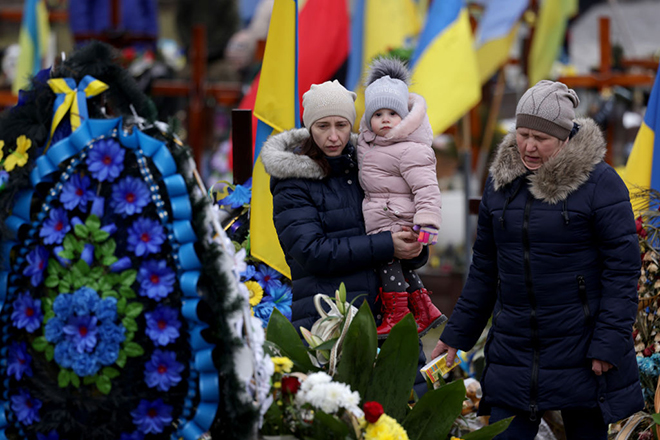 Ukrainians pay tribute to fallen soldiers on the anniversary of Russia’s invasion on Feb. 24.
Ukrainians pay tribute to fallen soldiers on the anniversary of Russia’s invasion on Feb. 24.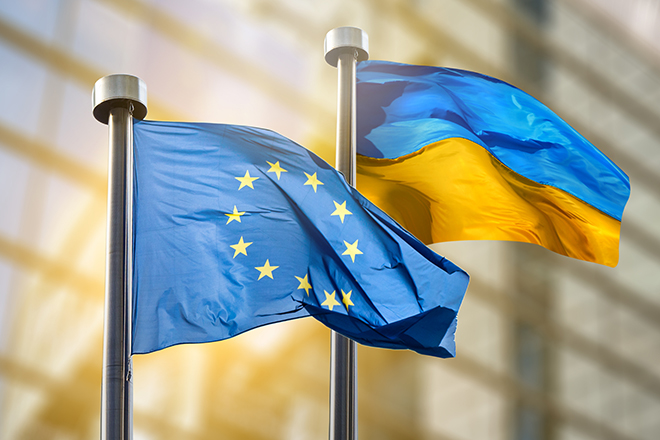 The flags of the EU and Ukraine against the European Parliament building in Brussels. The EU on Jan. 27 extended its sanctions against Russia.
The flags of the EU and Ukraine against the European Parliament building in Brussels. The EU on Jan. 27 extended its sanctions against Russia.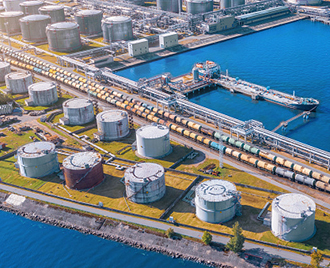 An oil-loading terminal in Russia. The Group of Seven economies and Australia agreed on a $60-per-barrel price cap for Russian oil.
An oil-loading terminal in Russia. The Group of Seven economies and Australia agreed on a $60-per-barrel price cap for Russian oil.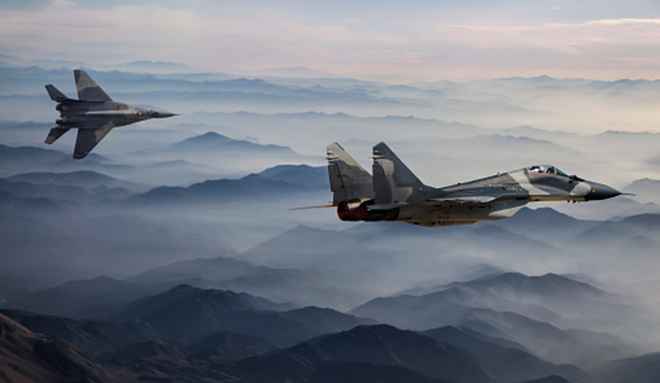 Russian MiG-29 fighter jets. The UK has banned the export of jet fuel to Russia.
Russian MiG-29 fighter jets. The UK has banned the export of jet fuel to Russia.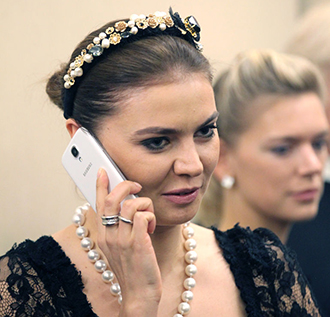 Retired Russian gymnast and politician Alina Kabaeva, who is alleged to have a close personal relationship with Vladimir Putin, in Sochi, Russia, in 2014.
Retired Russian gymnast and politician Alina Kabaeva, who is alleged to have a close personal relationship with Vladimir Putin, in Sochi, Russia, in 2014.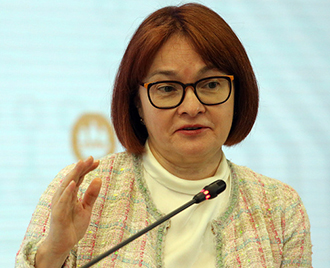 Russia’s central bank governor, Elvira Nabiullina, speaks in St. Petersburg, Russia, on June 3, 2021.
Russia’s central bank governor, Elvira Nabiullina, speaks in St. Petersburg, Russia, on June 3, 2021.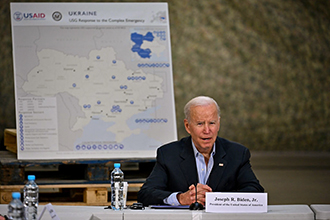 US President Joe Biden meets with Polish President Andrzej Duda on March 25 in Rzeszow, Poland.
US President Joe Biden meets with Polish President Andrzej Duda on March 25 in Rzeszow, Poland.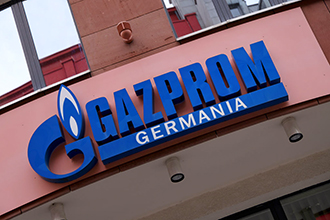 The corporate headquarters of Gazprom Germania, the German unit of Russian natural gas company Gazprom.
The corporate headquarters of Gazprom Germania, the German unit of Russian natural gas company Gazprom.